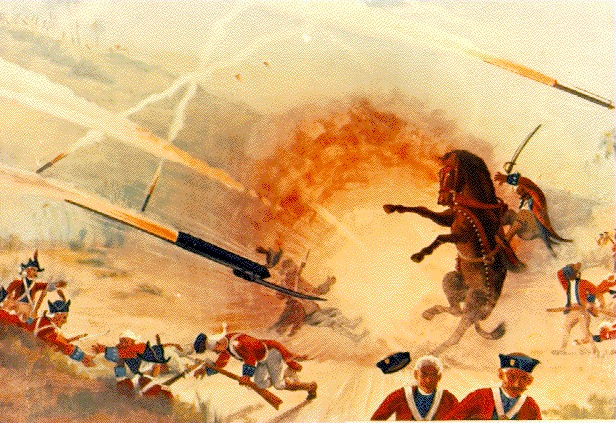Mysore: Birthplace of Military Style Rockets
They say fireworks originated in China, with the Ninth century Taoists alchemists inventing gunpowder to propel fire arrows. From China, gunpowder spread to several other present day countries like Mongolia, India, Britain and America, where curiousity led to experiments that further led to the invention of weapons like cannons and bombs. However, a landmark invention using gunpowder happened around the mid-17th century in Mysore, in India, that forever changed the history of warfare around the world.

Image Credit – http://en.wikipedia.org/wiki/File:Rocket_warfare.jpg
Brought about by Hyder Ali, the Sultan of the Kingdom of Mysore, the first iron-cased and metal-cylinder rocket artillery, made from iron tubes, were developed by the weapon suppliers of his son, Tipu Sultan. These ‘Mysorean Rockets’ eventually became the ‘Mother’ of all the present military rockets used by armed forces around the world. Hyder Ali and Tipu Sultan used these rockets effectively in some of the earliest battles the Indians fought against the East India Company. Needless to say, the British lost most of these battles since they could not match the advantage the use of rockets brought to the Sultans.
The entire road alongside Jumma Masjid and Taramandalpet, Bangalore, was dedicated to the research and manufacture of these rockets that proved to be a boon for the Sultans. The most successful innovation Hyder Ali and Tipu Sultan brought about in the original rockets was the addition of an iron cylinder to contain the propellant, thus providing a longer range for the missiles which were primarily a bunch of swords or blades. This was unlike anything the British had ever seen or known, and saying that they were thoroughly astonished with the weapon, would be a gross understatement. The Sultans won a number of battles in the Anglo-Mysore wars and thwarted quite a few British Generals including Colonel Arthur Wellesley, the first Duke of Wellington. The Royal Woolwich Arsenal in 1801, launched a research program which sent as many as 500 rockets from Mysore to Britain to study the rockets. Around 1805 the arsenal conducted the first demonstration of solid-fuel rockets. The British used the advanced ‘Congreve rockets’ which were the advanced counterparts of their eastern cousin, during the Napoleonic Wars.
Later during the Battle of Baltimore, 1812, the evolved forms of theses rockets were used by the British Forces.
Tipu Sultan, the king of Mysore, is also referred as father of modern missile technology, and rightly so. His contributions to the technology have finally got recognition and a missile museum, at the ruins of the Srirangpatnam Fort, from where the first 2 km missile was fired


